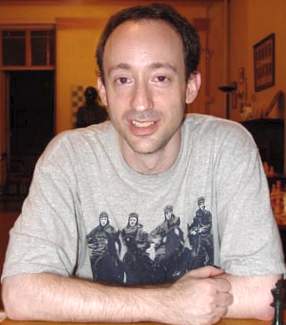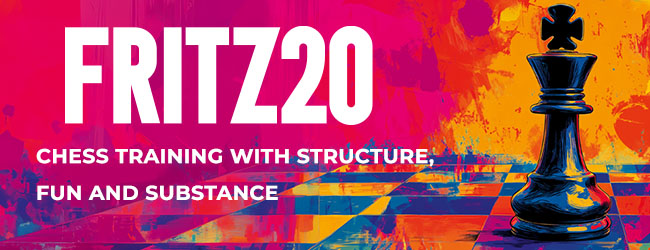Dennis Monokroussos writes:
The current world chess championship situation is a mess, and the absurd events
of the last week have only exacerbated the situation. Things were better in
1935, but not much: world champion Alexander Alekhine ducked Jose Capablanca
and others to beat up on Efim Bogoljubow, and probably thought he was going
to do the same to Dutchman Max Euwe later that year. (Little did he know!)
 Meanwhile,
the player who would ultimately replace Alekhine at the top of the chess world,
one Mikhail Botvinnik, was making his mark on the scene. The
Moscow 1935 tournament featured ex-world champions Emanuel Lasker and Capablanca,
the great Czech Salo Flohr, and a host of other talented players from Russia
and elsewhere. In this elite field, the 23-year old Botvinnik shined, tying
for first with Flohr half a point ahead of (the 67-year old!) Lasker and a
point ahead of Capablanca.
Meanwhile,
the player who would ultimately replace Alekhine at the top of the chess world,
one Mikhail Botvinnik, was making his mark on the scene. The
Moscow 1935 tournament featured ex-world champions Emanuel Lasker and Capablanca,
the great Czech Salo Flohr, and a host of other talented players from Russia
and elsewhere. In this elite field, the 23-year old Botvinnik shined, tying
for first with Flohr half a point ahead of (the 67-year old!) Lasker and a
point ahead of Capablanca.
Among the many outstanding games in this great event we can include Botvinnik’s
sixth round win over Nikolay Riumin. This game shared the best-game prize in
the tournament, and will be the subject of this week’s show. Riumin,
with White essayed the Worrall Attack against Botvinnik’s closed Ruy,
a line which typically results in a pitched battle over White’s pawn
center. By move 19, Riumin had pawns on d4, e5, f4, g4 and h3, but was this
a strength or a weakness? Against mere mortals, it might have proved a strength,
but not against the Patriarch!
We might not be able to play as well as Botvinnik, but we can learn from him
– and those who join me this Monday night at 9 p.m. will! If Kramnik
and Topalov play, this can be dessert; if they don’t, then this can be
the main course. No matter what, you’ll be able to see at least one world
champion in action!
Dennis Monokroussos'
Radio ChessBase
lectures begin on Mondays at 9 p.m. EDT, which translates to 02:00h GMT,
03:00 Paris/Berlin, 13:00h Sydney (on Tuesday). Other time zones can
be found at the bottom of this page. You can use Fritz or any Fritz-compatible
program (Shredder, Junior, Tiger, Hiarcs) to follow the lectures, or
download a free trial client. |
Note: you can watch older lectures by Dennis Monokroussos here:
Enter the above archive room and click on "Games" to see the lectures.
The lectures, which can go for an hour or more, will cost you between one and
two ducats.
That is the equivalent of 10-20 Euro cents (14-28 US cents).
 Dennis
Monokroussos is 40, lives in South Bend, IN, and is an adjunct professor
of philosophy at the University of Notre Dame.
Dennis
Monokroussos is 40, lives in South Bend, IN, and is an adjunct professor
of philosophy at the University of Notre Dame.
He is fairly inactive as a player right now, spending most of his non-philosophy
time being a husband and teaching chess. At one time he was one of the strongest
juniors in the U.S., but quit for about eight years starting in his early 20s.
His highest rating was 2434 USCF, but he has now fallen to the low-mid 2300s
– "too much blitz, too little tournament chess", he says.
Dennis has been working as a chess teacher for seven years now, giving lessons
to adults and kids both in person and on the internet, worked for a number
of years for New York’s Chess In The Schools program, where he was
one of the coaches of the 1997-8 US K-8 championship team from the Bronx, and
was very active in working with many of CITS’s most talented juniors.
When Dennis Monokroussos presents a game, there are usually two main areas
of focus: the opening-to-middlegame transition and the key moments of the middlegame
(or endgame, when applicable). With respect to the latter, he attempts to present
some serious analysis culled from his best sources (both text and database),
which he has checked with his own efforts and then double-checked with his
chess software.
Here are the exact times for different locations in the world. Please
double-check at World Time
and Date for your time zone.


















 Meanwhile,
the player who would ultimately replace Alekhine at the top of the chess world,
one Mikhail Botvinnik, was making his mark on the scene. The
Moscow 1935 tournament featured ex-world champions Emanuel Lasker and Capablanca,
the great Czech Salo Flohr, and a host of other talented players from Russia
and elsewhere. In this elite field, the 23-year old Botvinnik shined, tying
for first with Flohr half a point ahead of (the 67-year old!) Lasker and a
point ahead of Capablanca.
Meanwhile,
the player who would ultimately replace Alekhine at the top of the chess world,
one Mikhail Botvinnik, was making his mark on the scene. The
Moscow 1935 tournament featured ex-world champions Emanuel Lasker and Capablanca,
the great Czech Salo Flohr, and a host of other talented players from Russia
and elsewhere. In this elite field, the 23-year old Botvinnik shined, tying
for first with Flohr half a point ahead of (the 67-year old!) Lasker and a
point ahead of Capablanca.
 Dennis
Monokroussos is 40, lives in South Bend, IN, and is an adjunct professor
of philosophy at the University of Notre Dame.
Dennis
Monokroussos is 40, lives in South Bend, IN, and is an adjunct professor
of philosophy at the University of Notre Dame.




